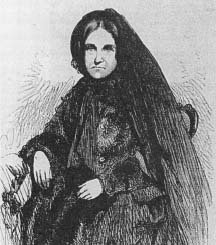Emma Cunningham Trail: 1857
Cunningham Makes Startling Announcement
From her prison cell Cunningham announced that she had been Burdell's wife and revealed a marriage certificate, which stated that the marriage took place on October 28, 1856. Eckel's physical appearance resembled Burdell's, however, and the police suspected that Cunningham had had Eckel impersonate Burdell to obtain the certificate. Further, Cunningham said she was pregnant with Burdell's baby. If Cunningham was Burdell's wife and the mother of his child, not only would it be harder for the prosecution to show motive for the murder but, if acquitted, Cunningham would be entitled to all of Burdell's $100,000 estate.
Cunningham's trial began May 6, 1857. Her lawyer was Henry L. Clinton. The prosecutor was District Attorney A. Oakley Hall and the judge was Recorder Smith. Very little of the actual trial testimony has survived, but according to several accounts, Cunningham testified that her marriage with Burdell was a happy one and she denied murdering her supposed husband. One of Burdell's maids, however, testified that Cunningham had once stated that Burdell was "not fit to live" and that it was time he "was out of this world." Further, according to the maid, Cunningham had called Burdell "a bad man."
Prosecutor Hall also introduced Mary Crane, an old friend of Dr. Burdell's, as a witness. Crane testified that shortly before his death Burdell told her "that he had let his house to a lady and that she was the most horrible woman he ever met." Further, according to Crane, Burdell suspected that Cunningham was involved with Eckel and had claimed that the two were "prowling about" at night.
Unfortunately for Hall, Burdell's own reputation made it difficult to make anything stick against Cunningham. Further, Clinton introduced witnesses such as Dr. Roberts, (no first name available) a colleague of Burdell's who testified that the relationship between Burdell and Cunningham had been to all appearances peaceful and loving. Finally, Cunningham's alleged pregnancy was now well advanced, and her abdomen was appropriately swollen whenever she appeared in public. On May 9, 1857, the jury returned a verdict of not guilty. Cunningham left the courtroom a free woman.
 Victorian morality prevented doctors from examining Emma Cunningham and proving her pregnancy false.
Victorian morality prevented doctors from examining Emma Cunningham and proving her pregnancy false.
The affair was not over yet, however.Dr. Uhl, (no first name available) who was attending to Cunningham during her supposed pregnancy, went to Hall and stated that he was suspicious. Uhl thought that Cunningham was simply stuffing her dress with cushions. Unfortunately, Cunningham had refused to let Uhl physically examine her, and Uhl's treatment had been limited to minor matters such as prescribing bed rest in response to Cunningham's verbal descriptions of her symptoms. At the time, however, it was not unusual for a woman to refuse physical examination during pregnancy on the grounds that it was immoral for any man not her husband to touch her.
Further, Victorian morality made it impossible for Hall to order Cunningham to submit to a proper medical examination. However, Hall ordered a stakeout of 31 Bond Street, where Cunningham still lived. On July 27, 1857, the police stopped a nun who was bringing a basket to the door. The basket contained a baby, which Cunningham had paid $1,000 to adopt.
Caught red-handed, Cunningham dropped her claims to Burdell's estate, thus implicitly admitting that she had never been married to Burdell nor been pregnant with his child. Hall didn't have any medical evidence to prove that Cunningham had faked her pregnancy, however, and since she had already been acquitted of Burdell's murder, the legal obstacles to bringing her to justice were practically insurmountable. Therefore, Hall was forced to let Cunningham go. Cunningham was smart enough to realize that she would always be under a cloud of suspicion in New York City, and she moved to California. Apparently she spent her final years running a moderately prosperous vineyard.
No one was ever convicted of Burdell's murder. If he had been able to get the proper medical evidence, Hall might have been able to prove that Cunningham was guilty. Victorian morality, however, prevented this. The real mother of the "market-basket" baby Cunningham had tried to purchase for $1,000 stayed in New York City, and rented her baby to P.T. Barnum's circus for $25 a week for the public to view.
—Stephen G. Christianson
Suggestions for Further Reading
Clinton, Henry Lauren. Celebrated Trials. New York: Harper & Brothers, 1897.
Duke, Thomas Samuel. Celebrated Criminal Cases of Ametica. San Francisco: James H. Barry Co., 1910.
Lewis, Alfred Henry. Nation-Famous New York Murders. New York: G.W. Dillingham Co., 1914.
Paul, Raymond. The Bond Street Burlesque: a Historical Novel of Murder. New York: W.W. Norton &Co., 1987.
Pearson, Edmund Lester. Murder at Smutty Nose, and Other Murders. Garden City, N.Y.: Dolphin Books, 1965.
Additional topics
Law Library - American Law and Legal InformationNotable Trials and Court Cases - 1833 to 1882Emma Cunningham Trail: 1857 - Cunningham Makes Startling Announcement, Suggestions For Further Reading